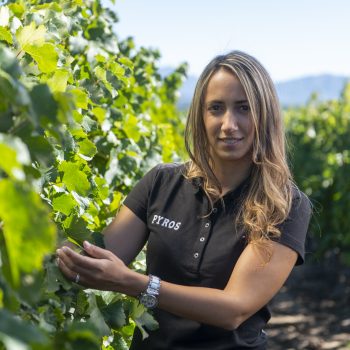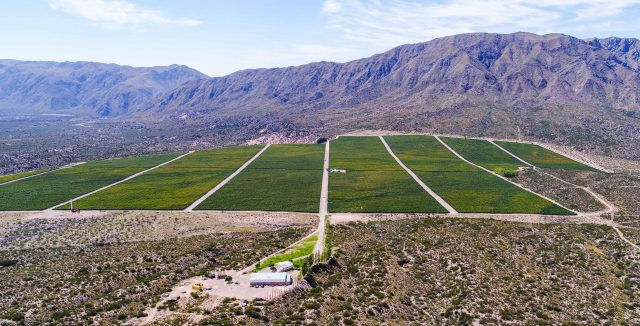This website uses cookies so that we can provide you with the best user experience possible. Cookie information is stored in your browser and performs functions such as recognising you when you return to our website and helping our team to understand which sections of the website you find most interesting and useful.
Women of Argentina: Paula González, head winemaker, Pyros Wines
This month Wines of Argentina marked the phenomenal contribution that Malbec has made to its vinous fortunes by hosting its twelfth Malbec World Day.

Held on the 17 April each year, the day proceeds a month-long celebration of the grape that has become synonymous with Argentina, where winemakers have taken the variety to new heights and unleashed its potential over the past 20 years. More than 20 official events were held in its key export markets, including the US, United Kingdom, China, Canada and Brazil.
“Throughout these 12 editions of Malbec World Day, the world has witnessed the evolution of our variety, which goes hand in hand with changes in general terms in the industry. For this reason, it is no coincidence that it continues to be by far the most developed, studied and exported variety. An icon that identifies us in the world,” said Magdalena Pesce, General Manager of Wines of Argentina.
The industry has collectively worked to make Argentine Malbec a global icon, but Wines of Argentina is keen to highlight the contribution made by women to this success too, in keeping with its ongoing commitment to create an egalitarian, sustainable and inclusive culture in the world of wine.
Last year Wines of Argentina signed up to the UN’s Women Empowerment Principles (the first wine trade body to do so), and it has also launched a new platform to support women working in wine. It wants every organisation in Argentina’s wine industry to be actively pursuing gender balance, offering support and guidance where needed to ensure women, and men, are given equal opportunities to succeed.
 More recently, Wines of Argentina joined the Sustainable Wine Round Table, a global coalition working to improve sustainability across the wine industry. Its aim is to lead the development of global sustainability standards and the sharing of best practices, helping to strengthen the environmental, social and economic sustainability of the global wine industry.
More recently, Wines of Argentina joined the Sustainable Wine Round Table, a global coalition working to improve sustainability across the wine industry. Its aim is to lead the development of global sustainability standards and the sharing of best practices, helping to strengthen the environmental, social and economic sustainability of the global wine industry.
“Despite the statements about the importance of gender equality and the programs implemented in different areas, it is evident that in reality progress is very slow in the achievement of relevant goals,” says Claudia Quini, National Audit Director of the National Institute of Viticulture (INV). “For this reason, it is necessary to continue with the actions in a constant manner, with women as vectors of public policies, and women as pillars of the sustainable development programs inherent to the sectors in which we commit ourselves to work.”
As part of its mission, we have been talking to some of Argentina’s most prolific female figures, highlighting their achievements, experiences and the work that still needs to be done. This month we spoke to Paula González, head winemaker at Pyros Wines in Pedernal, San Juan. Having graduated with a degree in Enology at the Universidad Juan Agustín Maza in Mendoza, González worked at Graffigna, where she was responsible for premium wines from Pedernal Valley, and at Bodega Casarena in Lujan de Cuyo, Mendoza. She has also spent time in Spain, working at Comando G, a winery outside of Madrid. González joined Pyros Wines in November of 2019. This year, Pyros’ Limestone Hill Malbec 2018 was awarded the best wine of Argentina in the Mundus Vinis 2022 competition.
We caught up with González to find out more about her career, Argentina’s ongoing discovery of new micro-terroirs and what makes wines from Pedernal so special.
To read our previous Women of Argentina interviews, click here on the following: Valeria Gamper, Magdalena Pesce, Laura Catena and Patricia Ortiz. For more information on Wines of Argentina’s Women of Argentina campaign, click here.

What was your path to becoming a winemaker?
I was born in Mendoza, the cradle of viticulture in Argentina, and also have a history of grandparents and parents who own small vineyards in the eastern part of Mendoza. I always knew that when I grew up I wanted to continue to be part of this world and part of the production of wine – to know what happens to the grapes once they are harvested. Today my greatest challenge is to lead the production and communication of ‘Pyros Wines’, making known the unique and distinctive characteristics of the Pedernal Valley and the Pyros Vineyard.
Malbec has played a huge part in the success of Argentine wine. To what extent have female winemakers played a part in that, and how is Argentina’s approach to Malbec evolving?
With the increased participation of women in the wine world, new production styles and new forms of communication of Argentine wines in general, and Malbec in particular, have been introduced. The recognition of Argentine Malbecs through awards has made it possible to discover that behind them are also leading professional women, changing the perception of consumers. I believe that Malbec has evolved with a greater understanding and discovery of terroirs, and I seek to express that evolution through wine. Malbec, like few varieties in the world, expresses place magnificently.
What changes have you seen over the course of your career in terms of gender equality and opportunity for women in wine?
Changes in favour of equal opportunities in the world of wine have been very slow, but today they are evident. As in most professions, women have had to make greater efforts to achieve recognition and better positioning. The changes have not been simultaneous or linear, but they are observed. Looking back, a lot of progress has been made. Looking to the future, there is still a long way to go to achieve the objective of equity.
Wines of Argentina recently set up a Women’s Platform and subscribed to the (UN) Women’s Empowerment principles (the first wine trade body to do so). What do you think this will achieve for Argentina’s wine industry and why is it important?
I think it is a very valuable and timely initiative. Proposing common policies for the wine industry with axes such as equal opportunities and sustainability, guide current consumer trends and changes in gender paradigms.
What can men working in the wine industry do to support gender equality in the workplace?
I think it would be useful to have a space for criticism and debate in companies, not only for men, but for the entire team, with the objective of empowering everyone in their respective roles, seeking to create an environment that’s more equitable and dynamic.
Pedernal in San Juan is a thriving, high quality wine region, but remains less known than others in Argentina. How would you describe the region and its wines, and what makes it so special?
Although Valle de Pedernal is still a little-known region it has infinite potential; the unique composition of its 480-million-year-old calcareous soils, the extreme weather conditions and its altitude are its main differentials. These conditions allow us to harvest with low PH levels and significant natural acidity. Thanks to these conditions, we can grow various varieties, both white and red. Pedernal wines have a different profile and are of the highest quality. They are very elegant wines with a great concentration of colour, marked fruit notes, wild flowers and fine-textured tannins. These qualities give a lot of personality and character to the wines.
What trends in Argentine wine are you most excited about right now?
The deepening in knowledge of terroir is what has impacted me the most in the last five years. It is fabulous how progress has been made in the knowledge and understanding of the soils, and forced the limits of climate by altitude or latitude. This has increased the diversity of Argentine wines from North to South, with winemakers able to produce different and better Malbecs as well as new varieties with great quality potential. Undoubtedly, knowing and discovering new micro-terroirs, of which Pedernal is an example, is the best thing that we are experiencing today in Argentine viticulture.
Who are your biggest role models in the world of wine and why?
Working in various wineries throughout my career has allowed me to meet great people who are today my role models, not only personally but for their contribution to oenology. Among them are Bernardo Bossi and Ignacio Lopez, who through their passion and dedication helped to mark my path. Jose “Pepe” Galante has also been a great inspiration. He is one of the greatest winemakers in Argentina with a long history of 45 vintages. He has great generosity and humility in passing on his knowledge and a contagious passion for oenology, which has remained intact over the years.
I must also highlight the contribution of Susana Balbo to the wine industry. She was the first woman to graduate with a Bachelor of Oenology and is also a businesswoman and politician who is always committed to actions relating to the industry.
What advice would you give to anyone starting out in the wine trade?
As a winemaker who loves her job, I would say that although it’s a profession that allows for continuous learning and cultural exchanges, among many other rewarding experiences, I would not recommend romanticising the profession. It is work that requires, in part, a lot of sacrifice, effort and dedication, which occasionally remains hidden behind the socially visible image of enjoyment.
Finally, what are your hopes for the future of Argentine wine?
I hope that Argentina’s wine offer can become increasingly extensive, that it meets the demands of the entire spectrum of consumers, from those who are just starting out to the most professional and demanding palates of the world. Argentina is a vast country. The technology and passion of professionals, agronomists and oenologists have allowed, through their wines, to express the diversity of terroirs. Without a doubt, this is the beginning, but we have a long way to go.
Related news
Burgundy 2023 en primeurs: cautious optimism
SWR: lighter bottles for entry level wines is 'the wrong message'
Ribera del Duero challenges 'out of date' perceptions in UK market

